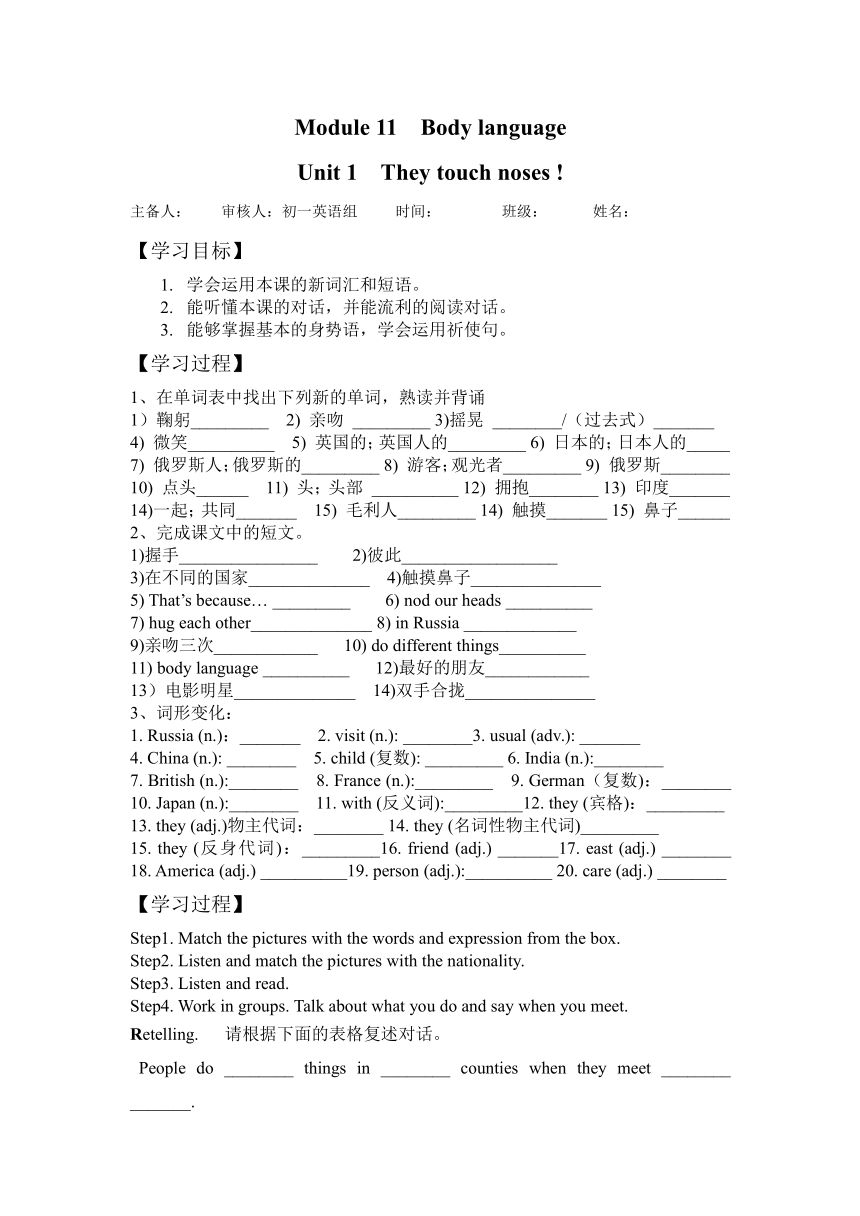
Module 11 Body language Unit 1 They touch noses ! 主备人: 审核人:初一英语组 时间: 班级: 姓名: 【学习目标】 学会运用本课的新词汇和短语。 能听懂本课的对话,并能流利的阅读对话。 能够掌握基本的身势语,学会运用祈使句。 【学习过程】 1、在单词表中找出下列新的单词,熟读并背诵 1)鞠躬_____ 2) 亲吻 _____ 3)摇晃 _____/(过去式)_____ 4) 微笑_____ 5) 英国的;英国人的_____ 6) 日本的;日本人的_____ 7) 俄罗斯人;俄罗斯的_____ 8) 游客;观光者_____ 9) 俄罗斯_____ 10) 点头_____ 11) 头;头部 _____ 12) 拥抱_____ 13) 印度_____ 14)一起;共同_____ 15) 毛利人_____ 14) 触摸_____ 15) 鼻子_____ 2、完成课文中的短文。 1)握手_____ 2)彼此_____ 3)在不同的国家_____ 4)触摸鼻子_____ 5) That’s because… _____ 6) nod our heads _____ 7) hug each other_____ 8) in Russia _____ 9)亲吻三次_____ 10) do different things_____ 11) body language _____ 12)最好的朋友_____ 13)电影明星_____ 14)双手合拢_____ 3、词形变化: 1. Russia (n.):_____ 2. visit (n.): _____3. usual (adv.): _____ 4. China (n.): _____ 5. child (复数): _____ 6. India (n.):_____ 7. British (n.):_____ 8. France (n.):_____ 9. German(复数):_____ 10. Japan (n.):_____ 11. with (反义词):_____12. they (宾格):_____ 13. they (adj.)物主代词:_____ 14. they (名词性物主代词)_____ 15. they (反身代词):_____16. friend (adj.) _____17. east (adj.) _____ 18. America (adj.) _____19. person (adj.):_____ 20. care (adj.) _____ 【学习过程】 Step1. Match the pictures with the words and expression from the box. Step2. Listen and match the pictures with the nationality. Step3. Listen and read. Step4. Work in groups. Talk about what you do and say when you meet. Retelling. 请根据下面的表格复述对话。 People do _____ things in _____ counties when they meet _____ _____. In Russia People usually _____ _____ times. In China People _____ _____ and _____.Sometimes we _____ our _____. In the US People_____ _____, _____ or _____ each other. In India People _____ their _____ together and _____ their _____. In New Zealand Maori people _____ _____. 【合作探究】 1. 祈使句 定义:祈使句是用来表示请求、命令、劝说、号召、警告等的句子。在祈使句中,通常省略第二人称主语you,以动词原形开头。 类型:V型:动词原形 + 其他 Be 型:Be + 形容词 Let 型: Let sb + 其他 No 型: No + v-ing/n. 注意: a)表示委婉、客气时,常加please b)祈使句的否定形式:一般在句首加don’t c)Let型的祈使句变否定句,可在句首加don’t,或者是let not do sth. 拓展:1. 祈使句的反意疑问句,若前面是否定结构,则附加问句只能用 will you。若前面是肯定结构,附加问句用 will you,也可用 won’t / would / can / can’t you 或 shall we 等, Exercise: 把所有的窗户都关上,好吗? Close all the windows, _____ _____/_____ _____ 别乘公共汽车去公园,好吗? _____ _____ to the park by bus, _____ _____ 2. let’s 用于提出建议并包括对方时,其附加问句用 shall we。let us 表示征求对方许可,其附加问句用 will you。let + 第三人称时,其附加问句用 will you。这种反意疑问句往往用来表示进一步征求对方的意见,使口气变得客气、委婉一些。如:Let’s go to see the pandas, shall we 咱们首先去看熊猫,好吗? Let us wait until 5:00, will you 让我们等 ... ...
~~ 您好,已阅读到文档的结尾了 ~~

